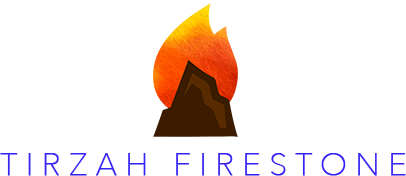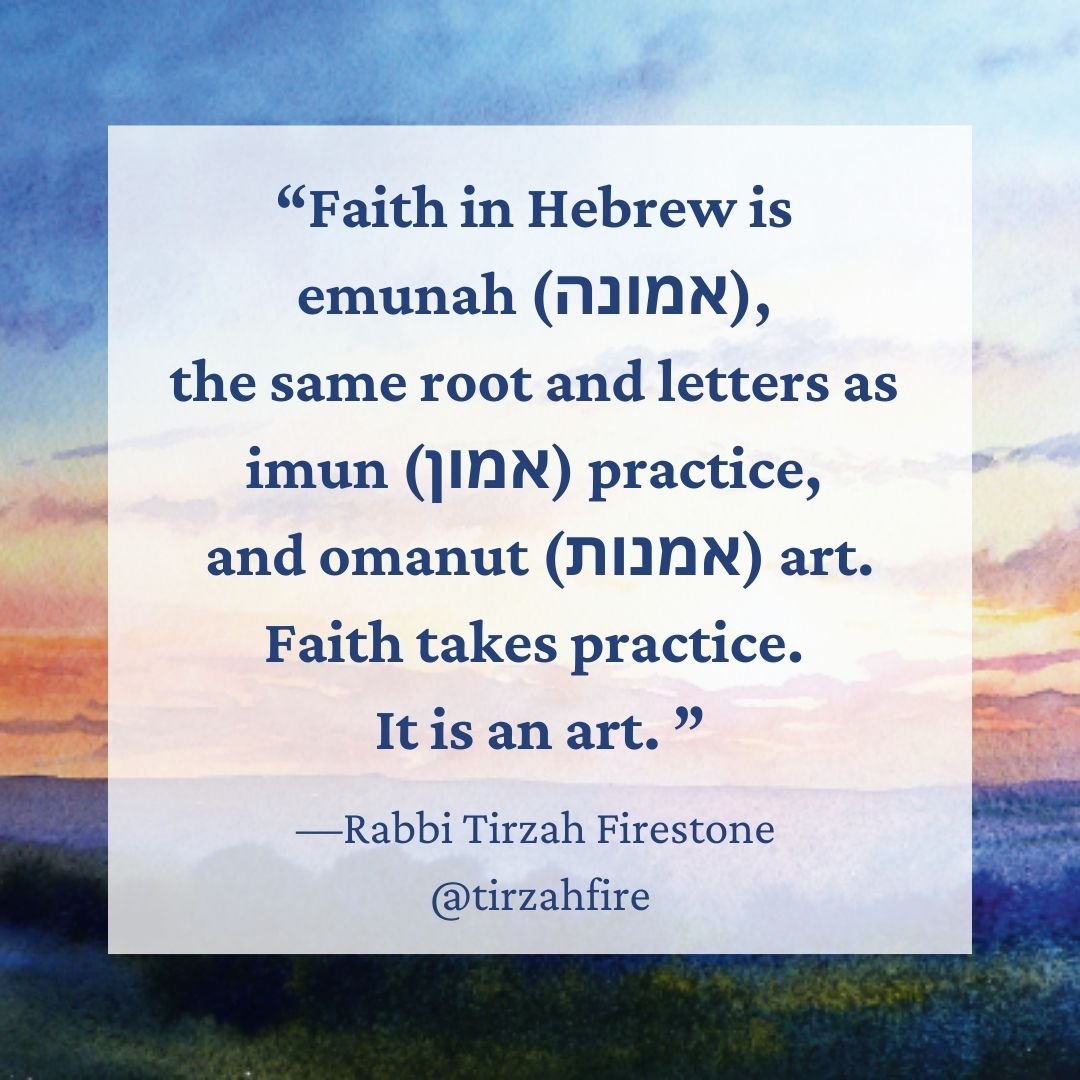Faith Takes Practice
This is an excerpt from the Kol Nidre drash given by Rabbi Tirzah Firestone to the congregation at Metivta Center for Contemplative Judaism on Kol Nidre, 10 Tishrei 5783, October 4, 2022. Watch the video above for the full talk.
I want to talk about faith, and what has happened to our faith this year.
How it sputters, and trickles and leaks away with the nightly news. I’m not even talking about faith in God. I’m talking about faith in life itself, and How our culture feeds us a diet of dystopian film and fiction, violent video, gory games online, and the very real news of encroaching climate chaos. It would really be hard not to be permeated by a feeling that our world is on a descending slope, our culture beyond the brink, our earth and all of her species too far gone to save. The mounting troubles of the past few years are “like a story arc with a foregone (and terrible) conclusion,” as my colleague Alicia Jo Rabins has written.
As Jews—whose ancestors are alive within us, and probably listening in—there is a familiar ring. We know all about impending doom, they say: Jew-hatred and fascism, we know that shoe—it’s always about to drop. Hey, our ancestors practically invented the term hyper-vigilant; they bequeathed it to us; it lives right here, in our nervous systems! So we come by our hyper-realism honestly, always on the lookout for the moment that: “this is truly troubling” tips into “we’re done for.”
On Yom Kippur, we may come to services ready for the high of togetherness, for an injection of holiness, expecting our faith to be buff.
But don’t be surprised if your faith feels anemic, a pale version of what it once was. If we are lucky we catch a glimpse of it when the cantor sings, or when the rabbi waxes eloquently. But the prayers themselves can have an unrealness, an out of synch-ness.
Either way, allow me to say that with the outsized pain in the world, with the unspeakable, unnecessary loss of life, of birds and species that we are living through, how could there not be a low-grade agnosticism creeping in? How cd our faith remain bullet proof through the past year, pummeled with breaking news from San Antonio, Buffalo, Ukraine?
Tonight is a night for confession, so I confess that as a rabbi, I have sometimes scared myself with: Maybe the humanists have it right, and this entire enterprise, this 4 billion-year experiment of life-on-earth is strictly a Darwinian phenomenon, now in the hands of a flawed and sick, 2-legged species? Maybe this ship is going down, and disaster is, inevitable.
Therefore, I was so deeply relieved to hear the words of Lord Rabbi Jonathan Sacks, of blessed memory, Chief Rabbi of GB, who stamped his foot and raged against this notion. He said.
Forget the word inevitable. It doesn’t exist. Forget it. Delete it. Search and delete. Inevitable does not exist, [At] these Jewish High Holidays, we are going to do the weirdest thing. Listen carefully, (he says) We are going to say a prayer, which goes, ‘On Rosh Hashanah, it is written. And on Yom Kippur, it is sealed.’ So that is the perfect statement of fatalism. [Our fate] is written over these 10 days, and there’s nothing you can do about it. And then precisely two minutes later, the entire synagogue erupts with the words, ‘U’teshuva, U’tefillah, U’tzedakah, penitence, prayer, and charity avert the evil decree.’ Nobody ever accepts any verdict as final in Judaism. There is no such thing. [Jews] completely throw out the concept of inevitability.”
In the midst of everything we are living through, these words are a balm for the malady of hopelessness. Because All the carnage, forest fires and ocean degradation, women’s rights, voting rights, and the vestiges of democracy slipping away… All of this can leave a person weak in the knees and hopeless.
And as Jews, our fear and our trauma history can sneak up on us. It can whisper to us cynically that faith… in our era? How’s that working for you?
But the longview (not the trauma view) of the Jewish perspective is prophetic. It splits the difference. The long-view is radically realistic and radically hopeful. It tells us, yes, humans can be by their very nature destructive, and…transformation is always possible: it tells us that history is bleak and recurrent… and, that miracles are happening all the time. It says that just as Nelson Mandela became president, after 27 years in a tiny cell, just as the Berlin Wall fell in a day, just as Ukraine now has a Jewish president, and just as the coral reef can recover, just as the women and men in Iran are in the streets, shrieking for their rights, God’s grace is worthy of our faith, and humankind, when we come together, when we seek higher ground, when we seize the staff of truth and put our will behind it, humankind can transform reality.
Rebecca Solnit says it this way: “Right now hope doesn’t mean envisioning rosy futures; it means knowing that the worst-case scenarios are not inevitable, and every day we are choosing together what direction we head in.”
Faith in Hebrew is emunah (אמונה), the same root and letters as imun, practice, and art (אמנות). Faith takes practice. It is an art. That is why we are here tonight from around the world: That is why Jews come together every year without fail,: to stand at the edge of history together, to look out at the world, and practice the artform of faith. To raise ourselves up from the strong seduction of the cultures in which we live, that would have us perish in hopelessness and inevitability.
In psychology we say there is no life without rupture; that every relationship and every person will probably go through the trauma of rupture at some time; the point is not to avoid it, but to repair it when it happens, and move forward, stronger than before.
Rupture and Repair.
Likewise In Kabbalah, we learn that this world, was hardwired from the beginning for breakage, rupture, leaving us an ongoing mandate to repair the world: tikun olam.
We, who have survived thousands of years of rupture, face into the facts on the ground with eyes wide open, with heart wide open, meet the breakage, we feel it, we heal it with our love.
We know about suffering, and we know how to call forth Power, not from a God outside of us who will make magic, but from the Indwelling Presence, the here & now power within us, between us, and among us.
In Judaism we call this indwelling presence Shechinah, and She too reminds us: there is no such word as inevitable. Banish the word.
The mystics called Shechinah by the name Night. On this holy night, I wish us all faith. I’d like to end with the words of poet Laura Weaver:
The Mother of Night
The mother of night comes
when you are full of the despair of the world—
when war and hunger and division
seem to be the only language humans know,
and the brokenhearted wander
with boxes of bones
they are still trying to mend.
The mother of night…
touches your scars and speaks
the stories of your wounds
even as she heals them.
And when you have forgotten
who you are, when you have forgotten
what is always possible,
when you have forgotten that birth
comes from death comes from birth
she shows you [that] sacred circle
And though you may bend and break
and shatter and disperse, she [will] breathe
memory [back] into these cracks—
and remind you to stop resisting,
to rest and simply listen
to the heartbeat of this sweet night.

